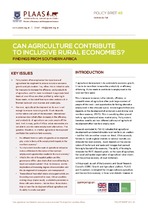Can agriculture contribute to inclusive rural economies?
Abstract
If agricultural development is to contribute to economic growth,
it has to do more than increase the productivity or efficiency
of farming. It also needs to contribute to employment in the
rural non-farm sector.
This is because increases in the intensity, efficiency or
competitiveness of agriculture often push large numbers of
people off the land – and opportunities for finding alternative
employment in the cities are scarce. Inclusive growth thus also
depends on the development of an inclusive and diverse rural
non-farm economy (RNFE). This is something often ignored
both by agricultural and labour market policy. Policymakers,
therefore, need to ask how different pathways of agricultural
development affect non-farm employment.
Research conducted by PLAAS indicates that agricultural
development can indeed stimulate local non-farm job creation
– but the links are neither simple nor direct. While access by
farmers to lucrative global markets or national markets can
stimulate the local economy, much depends on the precise
nature of the forward and backward linkages that connect
farming to the rest of the economy. The ability of farming to
stimulate the RNFE depends greatly on the scale of agriculture,
the social and spatial organisation of agricultural value chains
and the political economy of local institutions.

